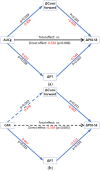Differential Susceptibility to the Impact of the COVID-19 Pandemic on Working Memory, Empathy, and Perceived Stress: The Role of Cortisol and Resilience
- PMID: 33803413
- PMCID: PMC7998983
- DOI: 10.3390/brainsci11030348
Differential Susceptibility to the Impact of the COVID-19 Pandemic on Working Memory, Empathy, and Perceived Stress: The Role of Cortisol and Resilience
Abstract
There are important individual differences in adaptation and reactivity to stressful challenges. Being subjected to strict social confinement is a distressful psychological experience leading to reduced emotional well-being, but it is not known how it can affect the cognitive and empathic tendencies of different individuals. Cortisol, a key glucocorticoid in humans, is a strong modulator of brain function, behavior, and cognition, and the diurnal cortisol rhythm has been postulated to interact with environmental stressors to predict stress adaptation. The present study investigates in 45 young adults (21.09 years old, SD = 6.42) whether pre-pandemic diurnal cortisol indices, overall diurnal cortisol secretion (AUCg) and cortisol awakening response (CAR) can predict individuals' differential susceptibility to the impact of strict social confinement during the Coronavirus Disease 2019 (COVID-19) pandemic on working memory, empathy, and perceived stress. We observed that, following long-term home confinement, there was an increase in subjects' perceived stress and cognitive empathy scores, as well as an improvement in visuospatial working memory. Moreover, during confinement, resilient coping moderated the relationship between perceived stress scores and pre-pandemic AUCg and CAR. In addition, in mediation models, we observed a direct effect of AUCg and an indirect effect of both CAR and AUCg, on change in perceived self-efficacy. These effects were parallelly mediated by the increase in working memory span and cognitive empathy. In summary, our findings reveal the role of the diurnal pattern of cortisol in predicting the emotional impact of the COVID-19 pandemic, highlighting a potential biomarker for the identification of at-risk groups following public health crises.
Keywords: COVID-19; anxiety; cortisol; depression; empathic concern; empathy; individual differences; perceived stress; perspective-taking; social confinement; stress; working memory.
Conflict of interest statement
The authors declare no conflict of interest. The funders had no role in the design of the study; in the collection, analyses, or interpretation of data; in the writing of the manuscript, or in the decision to publish the results.
Figures







Similar articles
-
Pre-pandemic Psychobiological Features Predict Impact of COVID-19 Confinement on Loneliness.Front Psychol. 2022 Apr 28;13:874232. doi: 10.3389/fpsyg.2022.874232. eCollection 2022. Front Psychol. 2022. PMID: 35572252 Free PMC article.
-
Salivary cortisol profiles of on-call from home fire and emergency service personnel.Stress. 2019 Jul;22(4):436-445. doi: 10.1080/10253890.2019.1584178. Epub 2019 Apr 2. Stress. 2019. PMID: 30935351
-
Sexual orientation and diurnal cortisol patterns in a cohort of U.S. young adults.Psychoneuroendocrinology. 2016 Jul;69:197-208. doi: 10.1016/j.psyneuen.2016.04.012. Epub 2016 Apr 21. Psychoneuroendocrinology. 2016. PMID: 27131052 Free PMC article.
-
Diurnal Cortisol Interacts With Stressful Events to Prospectively Predict Depressive Symptoms in Adolescent Girls.J Adolesc Health. 2017 Dec;61(6):767-772. doi: 10.1016/j.jadohealth.2017.06.005. Epub 2017 Sep 19. J Adolesc Health. 2017. PMID: 28935386 Free PMC article.
-
Stress, the cortisol awakening response and cognitive function.Int Rev Neurobiol. 2020;150:187-217. doi: 10.1016/bs.irn.2020.01.001. Epub 2020 Mar 11. Int Rev Neurobiol. 2020. PMID: 32204832 Review.
Cited by
-
Hair Cortisol, Perceived Stress, and the Effect of Group Dynamics: A Longitudinal Study of Young Men during Compulsory Military Training in Lithuania.Int J Environ Res Public Health. 2022 Jan 31;19(3):1663. doi: 10.3390/ijerph19031663. Int J Environ Res Public Health. 2022. PMID: 35162686 Free PMC article.
-
Predictors of stress in college students during the COVID-19 pandemic.J Affect Disord Rep. 2022 Dec;10:100377. doi: 10.1016/j.jadr.2022.100377. Epub 2022 Jul 3. J Affect Disord Rep. 2022. PMID: 35814812 Free PMC article.
-
Assessing the influence of COVID-19 lockdown measures on cognition and behavior in school age children in Arba Minch Health and Demographic Surveillance site, Southern Ethiopia: A cross-sectional study.PLOS Glob Public Health. 2024 Mar 21;4(3):e0002978. doi: 10.1371/journal.pgph.0002978. eCollection 2024. PLOS Glob Public Health. 2024. PMID: 38512931 Free PMC article.
-
Salivary cortisol in university students after the COVID-19 pandemic.Compr Psychoneuroendocrinol. 2022 Nov;12:100160. doi: 10.1016/j.cpnec.2022.100160. Epub 2022 Sep 20. Compr Psychoneuroendocrinol. 2022. PMID: 36157138 Free PMC article.
-
Empathy through the Pandemic: Changes of Different Emphatic Dimensions during the COVID-19 Outbreak.Int J Environ Res Public Health. 2022 Feb 20;19(4):2435. doi: 10.3390/ijerph19042435. Int J Environ Res Public Health. 2022. PMID: 35206623 Free PMC article.
References
-
- Pierce M., Hope H., Ford T., Hatch S., Hotopf M., Kontopantelis E., John A., Webb R.T., Wessely S., McManus S., et al. Mental Health Before and During the COVID-19 Pandemic: A Longitudinal Probability Sample Survey of the UK Population. SSRN Electron. J. 2020;7:883–892. doi: 10.2139/ssrn.3624264. - DOI - PMC - PubMed
Grants and funding
LinkOut - more resources
Full Text Sources
Other Literature Sources

